Exploring Farm Houses in the UAE: Culture and Market Insights
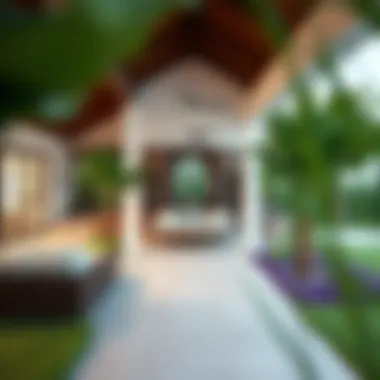

Intro
In recent years, the United Arab Emirates has witnessed a distinct shift in its real estate landscape, especially with the growing allure of farm houses. This phenomenon is not mere happenstance; it has deeply rooted connections to local culture, lifestyle preferences, and even investment strategies. While skyscrapers and luxury apartments often dominate discussions about UAE real estate, the emergence of farm houses has carved out a unique niche, attracting interest from various quarters including investors, families, and expatriates.
Farm houses in the UAE offer a slice of tranquility, away from the hustle and bustle of city life. They present themselves as peaceful retreats, enabling individuals to reconnect with nature and provide ample outdoor space for families. Understanding this market segment presents a myriad of opportunities for potential buyers and real estate professionals who keenly navigate this evolving landscape.
In this comprehensive exploration, we will delve into the architectural charm of farm houses, gauge the market dynamics driving their popularity, assess the financial potential they embody, and summarize why these properties have become an essential aspect of the UAE’s real estate tapestry.
Let's begin by analyzing the market closely, as that lays the foundation for understanding where farm houses stand today and where they might be heading.
Prolusion to Farm Houses in the UAE
The landscape of farm houses in the UAE presents a unique intersection of cultural heritage, architectural evolution, and contemporary real estate dynamics. These properties have carved out a distinct identity, attracting not just locals but also expats and investors, thanks to their combination of rural charm and proximity to urban conveniences. This article aims to explore the layers of significance embedded in these farm houses, unearthing the reasons behind their increasing popularity in the bustling market of the UAE.
Historical Context
Understanding the historical backdrop of farm houses in the UAE gives us valuable insight into their current relevance. The region's agrarian roots stretch back several centuries, with farming being a crucial component of life before the oil boom reshaped the economy. Once, these dwellings primarily served functional purposes, designed to support agricultural activities and provide shelter from the harsh desert environment.
Over the years, influences from migration, trade, and modernization have vastly transformed these structures. Initially built with local materials such as mud and palm fronds, many of these houses began to incorporate more robust construction materials as economic conditions improved.
The evolution of farm houses went hand-in-hand with changes in the local economy. For years, these houses remained markers of the UAE’s agricultural landscape. With the urban sprawl that followed industrialization and globalization, however, many traditional farm houses found themselves at the fringes of urban development. Today, they are rapidly gaining esteem, viewed not just as relics of the past, but as essential components of the nation's cultural narrative and heritage.
Furthermore, the rise of eco-tourism and a renewed interest in sustainable living have ushered in a revival of these properties. Where once they stood forgotten, now they represent a chance for investment imbued with historical significance as well as personal lifestyle appeal.
Cultural Significance
Farm houses are more than mere structures; they embody the spirit of the Emirati culture, reflecting values like community, hospitality, and connection to the land. Traditionally, these homes housed extended families, serving as gathering places for communal activities and celebrations. In a society where family bonds are cherished, these spaces foster connections that extend beyond individual households.
Moreover, farm houses are linked to the Bedouin traditions that emphasize a deep respect for nature and the environment. As many Emiratis seek to reconnect with their roots in a rapidly modernizing society, buying a farm house becomes an avenue for cultural restoration. It allows individuals and families to immerse themselves in a lifestyle that promotes simplicity, sustainability, and slower living, all while being a stone's throw away from the urban hustle.
In essence, these houses serve as both reminders of the past and beacons for a culturally rich future. Their significance cannot be understated; they appeal to investors looking for more than just properties, presenting an opportunity to invest in something rooted deeply in heritage and identity.
Farm houses in the UAE are not just spaces; they represent cultural legacy and the connection between past and present.
By examining these aspects, one begins to appreciate farm houses not just as real estate opportunities, but as vessels of culture, history, and community that are re-emerging in the contemporary narrative of the UAE.
Architectural Styles of UAE Farm Houses
The architectural styles found in UAE farm houses offer strong insights into the country’s cultural history and environmental adaptations. Understanding these styles paves the way for recognizing their significance within the broader context of real estate trends and investments in rural properties. They reflect a blend of traditional craftsmanship and modern techniques while catering to the preferences of buyers in today’s market. As such, the architectural choices are not merely aesthetic; they are thoughtful considerations that enhance livability, utility, and sustainability.
Traditional Designs
Materials Used
When we think about materials in the construction of farm houses in the UAE, it’s essential to consider how local environments play a role in those choices. Traditional designs often employ materials like mud bricks, palm fronds, and stone. These materials are not only abundant locally but also offer outstanding thermal performance, helping keep homes cooler during the scorching summer months. Mud is particularly valued for its natural insulating properties, making farm houses comfortable despite high temperatures outside.
The key characteristic of these materials is their ability to blend seamlessly with the natural landscape, offering an aesthetic that feels organic. For example, mud bricks provide a rustic charm that resonates with the farming ethos, making them a popular choice among those looking to maintain cultural authenticity. However, their sustainability can be a double-edged sword; while they have low environmental impact, they may require more regular maintenance compared to modern counterparts, which can deter some investors.
Construction Techniques
Traditional construction techniques are often labor-intensive, but they contribute immensely to the durability and aesthetics of farm houses. Techniques such as domed ceilings and courtyard designs have been passed down through generations. These practices foster ventilation and cooling, creating comfortable living conditions that capitalize on breezes flowing through the home.
The unique feature of these techniques lies in their adaptability; they can be modified to suit modern needs while retaining essential elements of traditional styles. This adaptability makes these techniques appealing as they bridge the past and present. However, the labor and time required for such constructs can deter investment, as quicker and cheaper modern alternatives might seem more appealing at first glance.
Modern Influences
Sustainable Practices
In today’s context, sustainability is increasingly becoming a priority for new farm house constructions. The adoption of sustainable practices, like solar panels and rainwater harvesting systems, has transformed how many view farm house investments. These practices not only reduce environmental impact but also lower long-term utility costs, making them a proactive choice for eco-conscious homeowners. With the UAE’s intense focus on diversifying energy resources, integrating green technology in rural properties can also increase their market value significantly.
One of the most salient features of sustainable practices is their ability to blend modern needs with traditional lifestyles. This combination appeals to a demographic looking for homes that embody both ecological responsibility and cultural significance. Yet, the initial costs of such technologies can be daunting for some buyers, posing a barrier to widespread adoption in this sector.
Innovative Features
Modern influences in farm houses also extend to innovative features. Smart home technologies are becoming increasingly common, introducing conveniences such as automated irrigation systems and energy-efficient equipment. These advancements enable homeowners to better manage resources, particularly water – a precious commodity in desert regions.
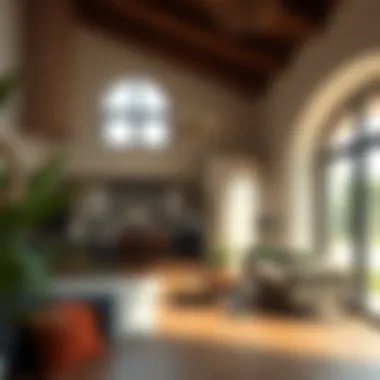
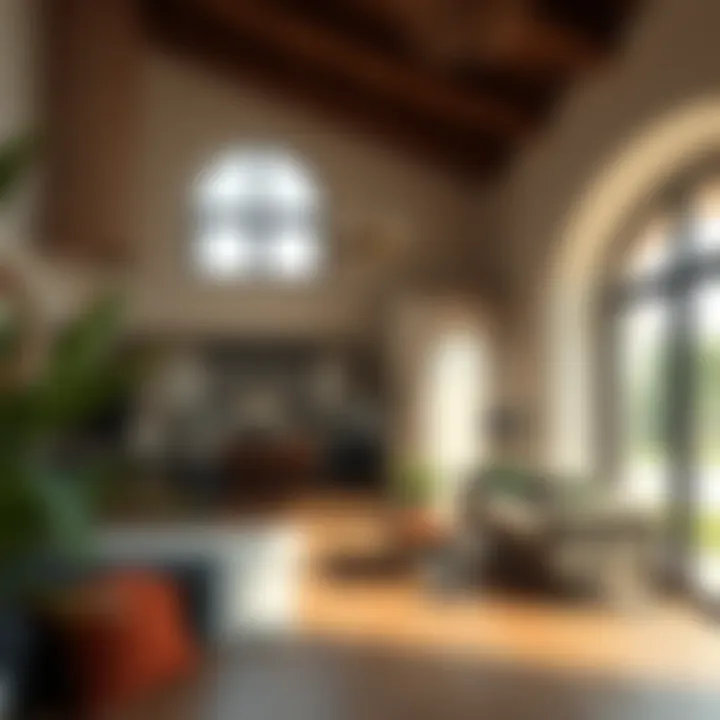
What stands out with these innovative features is their potential for increasing property value. They cater to a tech-savvy clientele who may prioritize lifestyle enhancements. However, reliance on technology may lead to complications; if systems fail, they could involve expensive repairs or replacements, underscoring the need for robust support services.
Innovation allows the seamlessly integrated blend of comfort and style, making farm houses not just homes, but a lifestyle choice as well.
For further exploration of architectural practices, you can visit Wikipedia and Britannica.
Market Dynamics
Demand Analysis
Buyer Preferences
Exploring buyer preferences offers significant insights into the motives and attributes that drive purchases in the farm house sector. An increasing segment of buyers prioritizes spacious living, away from the urban crowd. They seek properties that can provide a retreat, a slice of nature, and an escape from the fast-paced city life. As environmental consciousness rises, more buyers prefer homes that include eco-friendly features, such as solar panels or water conservation systems.
This trend reflects a desire for a healthier lifestyle, promoting a family-oriented atmosphere. Moreover, the unique aspect of being part of the farming community not only connects buyers with nature but also enhances their social fabric by integrating them into local cultures.
The appeal of a farm house lies in its potential for personalized development. Buyers often prefer to customize their spaces through landscaping or renovations, which fuels both satisfaction and investment potential. However, the lack of access to urban amenities can sometimes act as a drawback for certain buyers, leading them to reconsider their options.
Trends in Land Acquisition
Within the trends in land acquisition, one can observe how the market has evolved over the years. Accessibility and pricing significantly influence these trends. Many buyers are now opting for rural properties due to their relatively lower costs compared to urban areas. The significant advantage here is the ability to own larger parcels of land, conducive for diverse agricultural activities or recreational pursuits.
Additionally, the focus is shifting toward integrated planning, where multifaceted developments foresee allocation for homes alongside essential services. The land acquisition process is increasingly marked by buyer awareness of zoning laws and environmental regulations, which is vital for sustainable growth. Despite these advantages, the complexities of negotiation and securing titles often create hurdles that buyers must navigate.
Price Trends
Examining price trends is essential to understand the financial viability of investing in farm houses. The interplay between demand and supply directly impacts property value, making it vital for investors and buyers to keep a finger on the pulse of these fluctuations.
Comparative Analysis with Urban Properties
Analyzing farm house prices in comparison with urban properties helps paint a comprehensive picture of real estate dynamics in the UAE. Historically, farm houses offer a more affordable option but the price gap is narrowing as interest grows. The key characteristic to note here is that rural properties often find appreciation correlated to urban growth. As more city dwellers seek weekend retreats or second homes, the demand for these properties continues to rise.
In contrast, urban properties generally enjoy robust infrastructure and proximity to employment hubs, which keep their values buoyant. Investors must consider these competing aspects when deciding where to allocate their resources.
Factors Influencing Pricing
Several factors influencing pricing warrant attention, ranging from geographical location to the amenities available. Factors such as soil type, proximity to major roadways, and access to utilities can cause significant variations in prices. Moreover, economic conditions and external influences, like tourism or governmental development initiatives, play pivotal roles in shaping prices.
One unique aspect is the rise of agricultural zoning laws in the UAE, which has made farm houses an attractive investment for individuals aiming to grow organic produce. However, the financial feasibility can vary drastically based on the buyer's intent – whether for personal use or as an investment vehicle.
In summary, the market dynamics of farm houses in the UAE encapsulate a rich tapestry of buyer behaviors, pricing trends, and acquisition strategies. This knowledge is essential for any investor or prospective buyer looking to make an informed decision, as it informs them about both opportunities and challenges within this evolving market.
Investment Opportunities
Investing in farm houses in the UAE presents a lucrative avenue for those looking to diversify their portfolios. These properties not only hold cultural significance but also represent a unique market segment that continues to evolve. Opportunities for both long-term investments and short-term rentals are growing, appealing to a variety of investors ranging from seasoned professionals to first-time buyers. Understanding this landscape is crucial for making informed decisions that can yield substantial returns over time.
Long-term Investment Potential
Rural vs. Urban Investments
When considering investment in farm houses, one must weigh the merits of rural versus urban prospects. Rural investments often offer larger land spaces at comparatively lower prices. This characteristic makes them an attractive option for those seeking to establish a lifestyle away from the bustling city. On the flip side, urban farm houses, though pricier, present a unique charm and accessibility to local amenities, which can enhance their attractiveness to potential renters and buyers alike.
The critical advantage of rural investments lies in their vastness and potential for development. These areas usually enjoy less regulatory scrutiny, allowing for more flexibility in renovations and expansions. Yet, investors must consider the downside: rural locations may not attract as high a demand due to their distance from urban conveniences.
In contrast, urban investments are often more stable and can yield quicker returns. However, the competition tends to be fierce, which may drive prices upwards and limit opportunities for significant appreciation. In sum, it is essential for investors to align their choice with their long-term goals and risk appetite.
Future Development Plans
Future development plans significantly influence the farm house market’s potential. As the UAE continues to modernize and diversify its economy, government initiatives often shape opportunities for property development. Particular projects aimed at enhancing rural tourism and sustainability can increase the allure of farmland investments.
For instance, the push towards creating eco-tourism destinations fosters a favorable environment for developing eco-friendly resorts on farm properties. This trend provides not only a chance for a stable income stream but also promotes community involvement and environmental consciousness.
However, investors must keep an eye on local regulatory environments, as changes in land use policies could either bolster or hinder development efforts. Staying informed about upcoming infrastructure projects and government incentives is crucial for maximizing the investment's value.
Short-term Rental Market
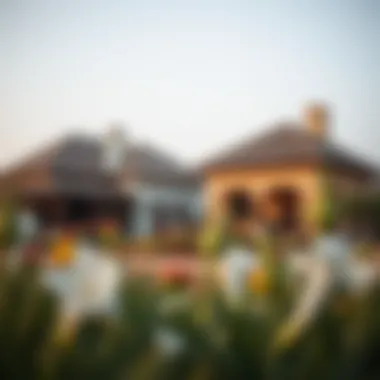
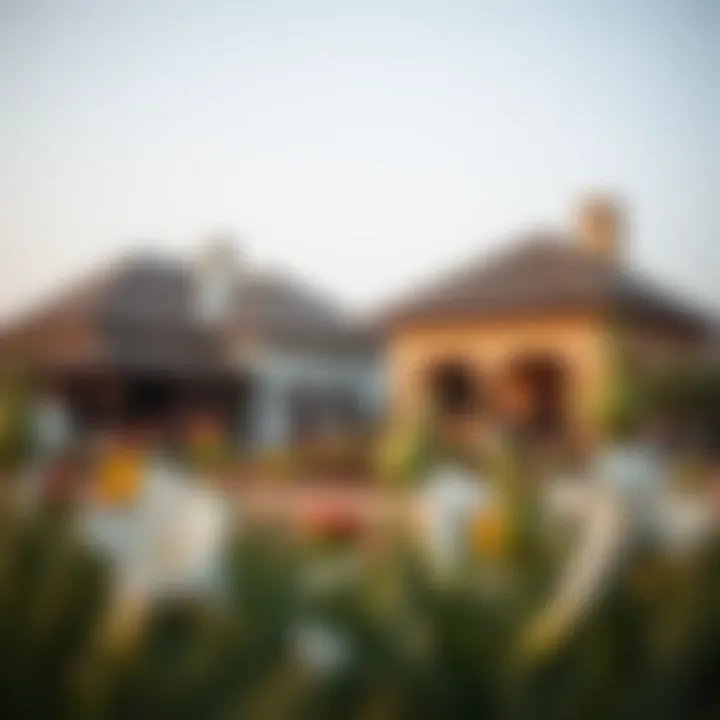
In recent years, the short-term rental market for farm houses in the UAE has gained immense traction. This segment appeals to both investors looking for passive income and those interested in tapping into the tourism sector.
Vacation Rentals
Vacation rentals provide an exciting opportunity for homeowners willing to share their space with tourists. The unique charm of farm houses draws both domestic and international visitors looking for a getaway from city life.
This characteristic of vacation rentals can lead to higher occupancy rates, especially during peak seasons. Properties equipped with attractive features, such as gardens or traditional architectural styles, can demand premium prices, making them potentially rewarding investments. Yet, the market’s seasonal nature means investors should plan for months where income may dip, given the fluctuating demand.
Ethical considerations also rise with vacation rentals, as homeowners must adhere to local regulations, which may restrict how many days a year a property can be rented out.
Event Hosting Potential
Farm houses not only serve as idyllic retreats but also possess incredible potential for hosting events. This aspect can become a significant source of revenue, especially for those particularly suited for weddings, retreats, or corporate gatherings. The spacious outdoor settings can provide memorable backdrops that enhance guests’ experience, thereby attracting more bookings.
Effectively marketing such spaces involves emphasizing the unique selling points of the farm house, from serene landscapes to rustic charm. However, it is crucial to factor in operational requirements like securing permits and potential renovations. Understanding these aspects will help investors understand the scale of effort required to capitalize on event hosting effectively.
In summary, whether focusing on long-term investment potential or engaging in the short-term rental market, opportunities abound in UAE farm houses. Evaluating specific factors like location, market dynamics, and personal goals can guide investors in making informed decisions that align with their aspirations.
Challenges in the Farm House Market
The market for farm houses in the UAE has been flourishing, yet it is not without its challenges. Understanding these hurdles is crucial for potential buyers, investors, and real estate professionals. Addressing issues like regulatory constraints and maintenance considerations can significantly impact decision-making and investment strategies, making this section a key component of the article.
Regulatory Hurdles
Land Use Regulations
Land Use Regulations play a pivotal role in the development and acquisition of farm houses in the UAE. These regulations determine how land can be used, which affects everything from housing density to permitted activities. One characteristic that stands out is the way regulations vary significantly across emirates. For example, producing agricultural products might be encouraged in some areas, while residential development may be strictly controlled in others. For investors, knowing these regional differences is vital.
Additionally, a unique feature of Land Use Regulations is the requirement for permits that can lead to complex application processes. While these steps can be seen as a disadvantage due to possible delays, they also ensure that development is sustainable and compatible with local communities. This balance can enhance the overall investment quality, making compliance rather than avoidance a more advantageous route.
Environmental Restrictions
Environmental Restrictions are another significant hurdle in the farm house market. These limitations are often implemented to preserve the natural landscape and biodiversity of the UAE. For instance, specific areas might have limitations on water usage or restrictions on certain types of construction materials. A notable characteristic here is the push for sustainable practices, which can enhance the project's reputation but also add layers of complexity to the building process.
While adopting eco-friendly solutions may appear as a considerable challenge, it can be beneficial for investors seeking long-term value. Sustainable builds often lead to lower operational costs and increased property value over time. However, the initial costs and the need for expert advice can deter some potential buyers, leaving them in a dilemma regarding the trade-offs involved.
Maintenance Considerations
Maintaining a farm house doesn't come without its own set of challenges. Both cost implications and time commitments have to be taken into account for anyone considering investment in this property type.
Cost Implications
Maintenance Cost Implications can be quite significant, especially in rural areas where logistics may inflate expenses. Typical costs involve routine upkeep, landscaping, and possibly even agricultural management if the owner is looking to operate a working farm. A key characteristic of these costs is the unpredictability factor; items like weather damage or pest control can lead to unexpected expenses. Dressing up a farm house with modern touches is appealing, but it generally requires budgeting for periodic maintenance on top of initial investment expenses.
Investors must evaluate whether they are prepared for these repeated financial outlays. Understanding that maintenance can contribute to the property's market value—especially if designed and executed well—can shift perception from viewing it as a burden to seeing it as an integral part of property ownership.
Time Commitment
Time Commitment is equally important to address when considering a farm house. Managing property, especially outside urban centers, often entails a considerable investment of time, whether for personal enjoyment or as part of a rental business. Property management might demand regular attention, or the owner may feel drawn into a lifestyle that differs significantly from urban living.
A unique feature of farm houses is how they often invite owners to engage actively with their land, which can be both fulfilling and time-consuming. This commitment to engaging with one's surroundings can reveal valuable experiences but may also clash with the busy lives many individuals lead. An understanding of how much time they can realistically allocate is vital for buyers to make informed choices that align with their lifestyle and goals.
Lifestyle Benefits of Owning a Farm House
Owning a farm house in the UAE is not just about having a property; it's about embracing a lifestyle that's steeped in charm and tranquility. The allure lies in several aspects that are unique to this type of dwelling. With the hustle and bustle of urban life, farm houses offer a sanctuary where one can experience a slower pace, a greater connection with community, and ample opportunities for customization.
Rural Living Appeal
Community Atmosphere
The community atmosphere that farm houses foster plays a significant role in enhancing one’s living experience. Unlike the often isolating structures found in urban settings, farm houses are typically situated in close-knit communities where neighbors know each other. This tight bond creates a sense of belonging that many find comforting.
Key characteristics here include shared interests and communal events such as harvest festivals or local markets. Such gatherings can lead to lifelong friendships and a network of support that is hard to come by in a city. Choosing to live in a farm house often means opting for a lifestyle enriched by collaboration and shared experiences.
However, a downside to community intimacy can be the lack of privacy. Those who value their solitude might find it challenging at times. Nevertheless, the benefits of having a supportive community often outweigh this concern.


Access to Nature
Living in a farm house means you'll have access to nature right at your doorstep. This connection to the environment can be invigorating, offering a daily reprieve from the concrete jungles. Imagine waking up to the sounds of chirping birds and the rustling of leaves rather than traffic noise. This natural setting can significantly reduce stress levels and contribute to overall mental well-being.
One of the most beneficial aspects of living in a naturally rich environment is the opportunity for outdoor activities. Whether it’s hiking, gardening, or simply enjoying a sunset, nature offers a backdrop that urban living can’t compete with. However, it is important to consider that not everyone is familiar with rural practices like farming or maintaining a landscape, which might present some challenges. Nonetheless, the rewards of improved health and serenity can be enticing.
Personalization of Space
Landscaping Choices
When it comes to a landscaping choices, farm houses provide ample opportunities for personal touches. Homeowners often find joy in designing their outdoor spaces, whether through creating lush gardens, vegetable patches, or serene patios. This customization lets residents express their personalities through greenery and design.
One of the most appealing aspects of landscaping is how it enhances not just the aesthetic but also the utility of the property. Creating private nooks for relaxation or spaces for family gatherings can transform a house into a home that reflects one's values and lifestyle. However, homeowners must be aware of the environmental conditions and what plants thrive in the region. Without proper planning, it can result in higher maintenance costs and efforts.
Home Renovation Options
Home renovation options add another layer of excitement for those who own a farm house. Unlike conventional urban properties, farm houses often come with unique architectural features waiting to be enhanced or restored. From rustic wooden beams to expansive porches, the possibilities for renovation are limited only by imagination.
Renovating allows owners to adapt the space according to their personal needs or even to incorporate modern amenities into traditional designs. However, such alterations can be costly and time-consuming. Balancing the preservation of character with the need for update can be a delicate dance. The end results, however, often yield a space that merges functionality with personal flair.
Considering these lifestyle benefits paints a vivid picture of what it means to own a farm house in the UAE. It is not merely about having a place to live; it's about cultivating an entirely new way of life that harmonizes community spirit, nature, and personal expression.
Future of Farm Houses in the UAE
The future of farm houses in the UAE holds significant weight in the real estate and lifestyle spheres. As urban centers expand, the allure of rural living grows stronger, creating a palpable shift in residential preferences. Not only do farm houses offer a retreat from the hustle and bustle of city life, but they also present unique investment opportunities that could be rewarding for those who take the plunge. It's here that innovative developments and evolving market trends paint a vivid picture of what lies ahead.
Innovative Developments
Smart Home Features
One of the most noteworthy trends in the future of farm houses is the incorporation of smart home features. These advancements turn traditional farm houses into technological hubs designed for modern living. With systems that manage lighting, temperature, and security all at your fingertips via smartphones, this high-tech approach is notably attractive.
Key characteristics include:
- Home Automation such as smart thermostats, which can lead to energy savings.
- Integrated Security Systems that monitor your property remotely.
The unique advantage of these smart features is their ability to enhance convenience while promoting energy efficiency. This minimizes the environmental footprint which aligns well with sustainability goals. However, one must consider the initial investment and ongoing maintenance costs, which could deter some buyers looking for simpler options.
Sustainable Living Initiatives
Another significant aspect shaping the future of farm houses revolves around sustainable living initiatives. With increasing awareness of environmental conservation, many developments are focusing on eco-friendly practices. This ranges from using renewable energy sources like solar panels to employing sustainable construction materials.
Key highlights include:
- Water Conservation Techniques such as rainwater harvesting.
- Permaculture Designs that promote biodiversity and soil health.
These unique features not only reduce ecological impact but also appeal to a growing demographic that prioritizes green living. However, challenges can arise regarding the upfront costs and the need for ongoing education on managing such systems effectively.
Evolving Market Trends
Urban Migration Effects
Urban migration has had a profound impact on the dynamics of the farm house market. As metropolitan areas become increasingly congested, more individuals are seeking the tranquility that rural surroundings offer. This has led to a burgeoning interest in farm houses as viable living alternatives.
Key characteristics of this trend include:
- Work-from-Home Opportunities that allow city dwellers to shift their base.
- Increased Demand for Properties with Land due to a desire for more personal space.
Notably, this shift by urban populations drives up demand and can lead to a gendering of property values in rural areas, potentially making them a more competitive market. However, it’s crucial for investors to remain informed about potential saturation points.
Shift in Investment Strategies
The shift in investment strategies highlights how market players are adapting to these changes. Investors are now looking toward farm houses not just as homes but as adaptive strategies for portfolio diversification. With the economy fluctuating, assets in less urbanized settings can sometimes offer stability and growth potential.
The notable aspects include:
- Long-term Investment Focus as buyers invest in land expecting future appreciation.
- Short-term Rentals as an alternative way to capitalize on investment properties.
This evolving focus on farm houses could lead to a more robust real estate market, but potential investors should carefully analyze local regulations and market conditions to ensure informed decisions.
"The future is not something we enter. The future is something we create."
This quote encapsulates the essence of investing in the future of farm houses in the UAE. As trends shift and preferences evolve, there’s a unique opportunity for forward-thinking individuals to craft their narratives amid changing landscapes.



